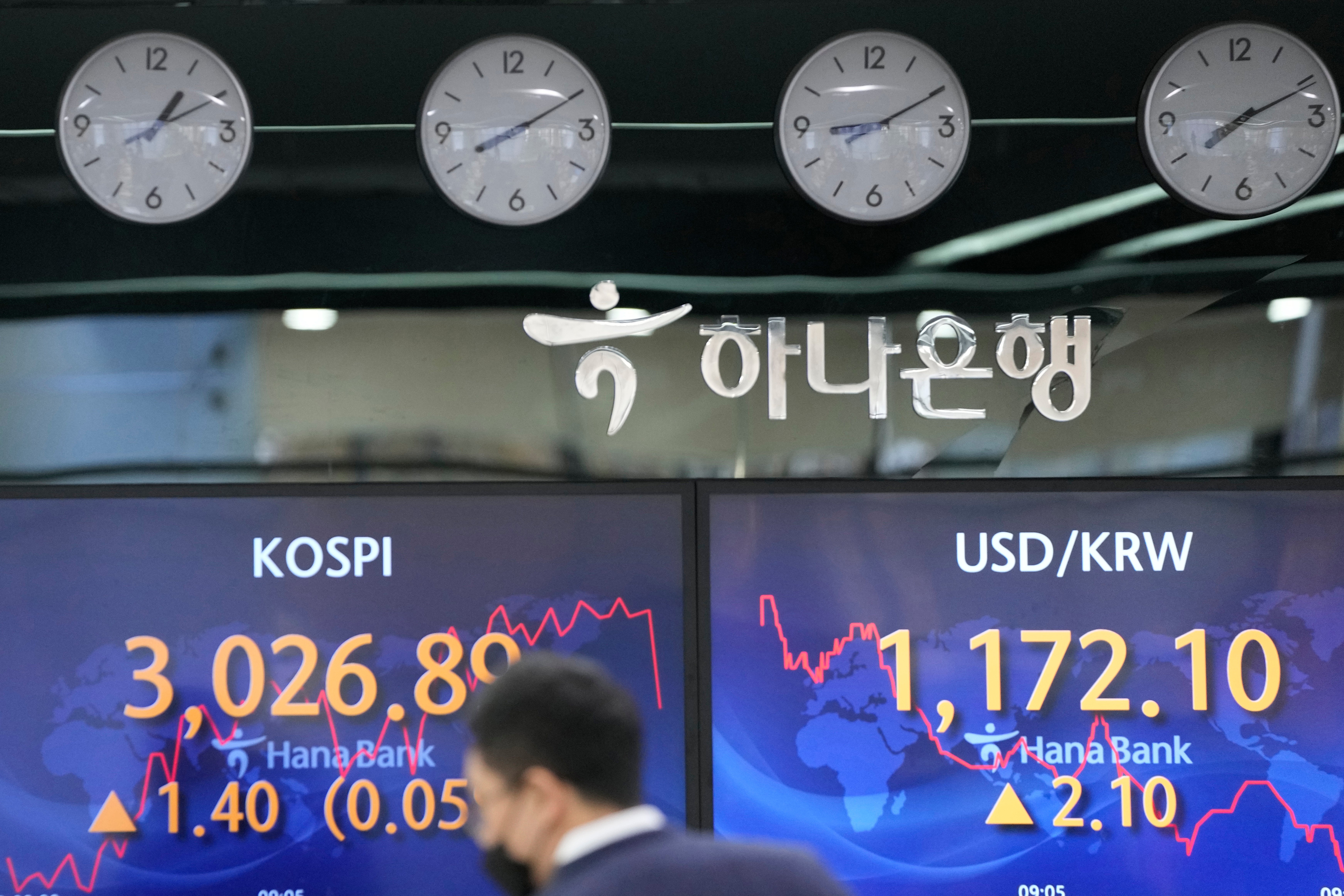Asian shares pull back, chilled by decline on Wall Street
Asian shares have fallen after a retreat on Wall Street as banks and health care companies pulled the S&P 500 and the Dow Jones Industrial Average back from their latest record highs

Your support helps us to tell the story
From reproductive rights to climate change to Big Tech, The Independent is on the ground when the story is developing. Whether it's investigating the financials of Elon Musk's pro-Trump PAC or producing our latest documentary, 'The A Word', which shines a light on the American women fighting for reproductive rights, we know how important it is to parse out the facts from the messaging.
At such a critical moment in US history, we need reporters on the ground. Your donation allows us to keep sending journalists to speak to both sides of the story.
The Independent is trusted by Americans across the entire political spectrum. And unlike many other quality news outlets, we choose not to lock Americans out of our reporting and analysis with paywalls. We believe quality journalism should be available to everyone, paid for by those who can afford it.
Your support makes all the difference.Asian shares fell Thursday after a retreat on Wall Street as banks and health care companies pulled the S&P 500 and the Dow Jones Industrial Average back from their latest record highs.
Shares fell in most major regional markets and oil prices also declined.
In Seoul the Kospi edged 0.2% higher, to 3,030.56, after Samsung Electronics reported its highest quarterly profit in three years thanks to continued robust demand for its computer memory chips.
Samsung’s dual strength in parts and finished products has allowed it to flourish during the pandemic as millions of people were forced to work at home. However, the company said it was dealing with “longer-than-expected” component shortages that may affect the demand for semiconductors during the current quarter.
Tokyo's Nikkei 225 index lost 0.8% to 28,867.56 after the Bank of Japan kept its monetary policy unchanged at a meeting that wrapped up Thursday.
The central bank warned of downward pressure on the world's third largest economy from the pandemic and from “supply-side constraints" like shipping delays and bottlenecks and shortages of computer chips and other manufacturing materials.
It downgraded its growth forecast for the fiscal year ending in March to 3.4% from the 3.8% estimate it issued in July. It forecast that inflation would be 0.0% this year, a sharp decrease from its earlier forecast of 0.9%.
But it also said it expects improvement as the impact of COVID-19 gradually wanes, “mainly due to widespread vaccinations, the economy is likely to recover, supported by an increase in external demand, accommodative financial conditions, and the government’s economic measures," it said.
In Hong Kong, the Hang Seng gave up 0.1% to 25,613.61, while the Shanghai Composite index dropped 1.1% to 3,524.93. The S&P/ASX 200 in Sydney shed 0.3% to 7,426.40.
Flaring cases of coronavirus in China and Singapore have added to doubts over the economic outlook, given signs that inflationary trends might lead central banks to step up moves to tighten monetary policy.
In New York on Wednesday, the S&P 500 slipped 0.5% to 4,551.68. More than three fourths of the companies in the benchmark index fell, with financial, health care and industrial stocks accounting for most of the decline.
The Dow Jones Industrial Average lost 0.7% to 35,490.69. Both it and the S&P 500 had logged record highs the day before.
Most of the blue-chip index's stocks were in the red, led by Visa, which slumped 6.9% a day after reporting strong quarterly results.
The Nasdaq edged up less than 0.1% to 15,235.84, and the Russell 2000 index of small companies took the heaviest losses, falling 1.9% to 2,252.49.
Long-term bond yields fell significantly and weighed down banks, which rely on higher yields to charge more lucrative interest on loans. The yield on the 10-year Treasury fell to 1.53% from 1.61% late Tuesday. It was steady at 1.55% early Thursday.
The yield on the 30-year Treasury fell below 2% for the first time in a month to 1.96%, even though rates on shorter-term U.S. bonds, like the 2-year Treasury note, have been rising.
U.S. crude oil prices fell 2.4% and pushed energy stocks lower. Exxon Mobil dropped 2.6%.
On Thursday, U.S. benchmark crude lost $1.41 to $80.25 per barrel. Brent crude, the basis for international pricing, declined $1.50 to $82.37 per barrel.
A steady flow of corporate report cards continues Thursday with industrial bellwether Caterpillar and technology giant Apple. Amazon and Starbucks will also report their results on Thursday.
Outside of earnings, investors will get an update on U.S. economic growth when the Commerce Department releases its report on third-quarter gross domestic product on Thursday.
Rising inflation remains a key concern for investors as they monitor earnings and the impact from supply chain problems and higher prices on businesses and consumers. Investors are also looking ahead to the Federal Reserve's meeting next week to see how it moves forward with plans to trim bond purchases and its position on interest rates.
The central bank has maintained that inflation will prove to be “transitory” and tied to the economic recovery, though it has been more persistent than initially anticipated.
In other trading, the dollar fell to 113.55 Japanese yen from 113.83 yen. The euro was flat at $1.1603.